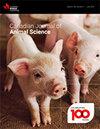饲粮乳化剂和脂质源对肉鸡肉质、脂质和血清抗氧化状态的影响
IF 1
4区 农林科学
Q3 AGRICULTURE, DAIRY & ANIMAL SCIENCE
引用次数: 0
摘要
摘要本研究旨在评估含有酸性大豆油(ASO)作为脱胶大豆油(DSO)替代品的饮食(含或不含乳化剂)对研磨机血清脂质成分、抗氧化剂保护、胴体产量和肉类质量的影响。七百零四只一天大的雄性小鸡以2×2因子排列(有或没有乳化剂×两种脂质源——ASO和DSO)分布,有八个复制品。在21天龄时,ASO的膳食摄入量增加了65.87%的血清超氧化物歧化酶活性。乳化剂的加入干扰了血清低密度脂蛋白和甘油三酯,在49天龄时,鸟类的嫩点产量降低了5.22%,腹部脂肪百分比降低了10.20%。对于含有DSO的肉鸡喂食膳食的肉,死后15分钟的持水能力、大黄色强度(B*)和死后24小时的低pH值均增加。来自肉鸡的肉补充了含有ASO和乳化剂的饮食,显示出较低的剪切力。乳化剂没有提供额外的代谢能量,这反映在降低的鸡肉嫩凝胶产量上。ASO的使用提供了更好的血清抗氧化剂状态,对肉鸡的胴体和肉质量没有不利影响。摘要:本研究的目的是评估含有酸性大豆油作为去污大豆油替代品(含或不含乳化剂)的饮食对肉鸡的血脂组成、抗氧化保护、胴体产量和肉质量的影响。704只1日龄雄性小鸡以2 x 2因子实验设计(含或不含乳化剂x两种脂质来源——酸性大豆油[ASO]和去纤维化大豆油[DSO])分布,共8次复制。21日龄时,膳食中ASO使血清超氧化物歧化酶活性增加65.87%。乳化剂的加入使49日龄鸡的鱼片产量降低了5.22%,腹部脂肪百分比降低了10.20%,干扰了血清低密度脂蛋白和甘油三酯。对于接受DSO饮食的鸡的肉,死后15分钟的保水能力增加,黄色(B*)强度增加,死后24小时的pH值降低。喂食ASO和乳化剂的鸡的肉显示出较低的剪切力。乳化剂没有提供额外的代谢能量,这取决于鸡里脊肉的产量较低。ASO的使用提供了更好的血清抗氧化状态,对肉鸡的胴体和肉质量没有有害影响。[由编辑翻译]本文章由计算机程序翻译,如有差异,请以英文原文为准。
Effects of dietary emulsifier and lipid source on broiler meat quality, lipids, and serum antioxidant status
Abstract This study aimed to evaluate the effects of diets containing acid soybean oil (ASO) as a substitute for degummed soybean oil (DSO), with or without an emulsifier, on the serum lipid composition, antioxidant protection, carcass yield, and meat quality of broilers. Seven hundred and four 1-day-old male chicks were distributed in a 2 × 2 factorial arrangement (with or without emulsifier × two lipid sources—ASO and DSO), with eight replicates. The dietary inclusion of ASO increased by 65.87% the serum activity of the superoxide dismutase at 21 days of age. The inclusion of the emulsifier reduced the tenderloin yield of the birds by 5.22% and the abdominal fat percentage by 10.20% at 49 days of age, interfering with serum low-density lipoprotein and triglyceride. There was an increase in the water-holding capacity, greater yellow intensity (b*) 15 min post mortem, and lower pH 24 h post mortem for meat from broilers fed diets containing DSO. Meat from broilers fed diets containing ASO with an emulsifier showed lower shear force. The emulsifier did not provide additional metabolizable energy, as reflected by the reduced chicken tenderloin yield. The use of ASO provided better serum antioxidant status, with no deleterious effects on the carcass and meat quality of broilers. Résumé Cette étude avait pour but d’évaluer les diètes contenant l’huile de soja acide comme substitut de l’huile de soja démucilaginée, avec ou sans agent émulsifiant, sur la composition des lipides sériques, la protection antioxydante, le rendement de carcasse et la qualité de viandes des poulets à griller. 704 poussins mâles âgés de 1 jour ont été distribués dans un design expérimental factoriel 2 x 2 (avec ou sans agent émulsifiant x deux sources de lipides – huile de soja acide [ASO — « acid soybean oil »] et huile de soja démucilaginée [DSO — « degummed soybean oil »]), avec huit réplicats. L’inclusion alimentaire d’ASO a augmenté de 65,87 % l’activité sérique de la superoxyde dismutase à l’âge de 21 jours. L’inclusion de l’agent émulsifiant a réduit le rendement de filet par 5,22 % et le pourcentage de gras abdominal de 10,20 % des poulets à l’âge de 49 jours, interférant ainsi avec le LDL sérique et les triglycérides. Il y a eu une augmentation de la capacité de rétention d’eau, une plus grande intensité jaune (b*) 15 minutes post mortem et un plus faible pH 24 heures post mortem pour la viande provenant des poulets ayant reçu les diètes avec DSO. La viande provenant des poulets ayant reçu les diètes avec ASO et agent émulsifiant a montré une plus faible force de cisaillement. L’agent émulsifiant n’a pas fourni une énergie métabolisable supplémentaire, selon le rendement plus faible en filet de poulet. L’utilisation d’ASO a fourni un meilleur état antioxydant sérique sans effets délétères sur la qualité de la carcasse et de la viande chez les poulets à griller. [Traduit par la Rédaction]
求助全文
通过发布文献求助,成功后即可免费获取论文全文。
去求助
来源期刊

Canadian Journal of Animal Science
农林科学-奶制品与动物科学
CiteScore
2.30
自引率
0.00%
发文量
51
审稿时长
6 months
期刊介绍:
Published since 1957, this quarterly journal contains new research on all aspects of animal agriculture and animal products, including breeding and genetics; cellular and molecular biology; growth and development; meat science; modelling animal systems; physiology and endocrinology; ruminant nutrition; non-ruminant nutrition; and welfare, behaviour, and management. It also publishes reviews, letters to the editor, abstracts of technical papers presented at the annual meeting of the Canadian Society of Animal Science, and occasionally conference proceedings.
 求助内容:
求助内容: 应助结果提醒方式:
应助结果提醒方式:


